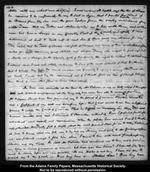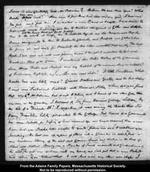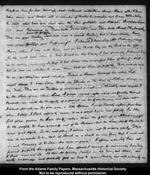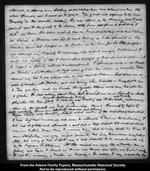Motive with me, which was decisive. I was in very ill health and the Air of Worcester appeared to be unfriendly to me, to such a degree that I panted for want of the Breezes from the Sea and the pure Zephirs from the rocky mountains of my native Town: that my Father and Mother invited me to live with them, and as there never had been a Lawyer in any Country Part of the thenCounty of Suffolk, I was determined at least to look into it and see if there was any chance for me. They replied that the Town of Boston was full of Lawyers and many of them of established Characters for great long Experience, great Abilities and extensive Fame, who might be jealous of such a Novelty as a Lawyer in the Country part of their County, and might be induced to obstruct me. I returned that I was not wholly unknown to some of the most celebrated of those Gentlemen, that I believed they had too much candour and Generosity to injure a young Man, and at all Events I could but try the experiment, and if I should find no hope of Success I should then think of some other place or some other course.
An Error was committed at this time by Mr. Putnam or me or both, which I thought little not of much consequence at the time, and have never been able to account for since. Mr. Putnam should have presented me, to the Court of Common Pleas in Worcester, and a Certificate of my Oath and Admission, before that Court would have been a sufficient Ground, to justify the Court of Common Pleas in Suffolk, on receiving me there. This was however omitted, and I removed to Braintree without it. Here I passed a few Weeks not without much Anxiety and Apprehension. When the October term arrived I went to Boston and attended the Tryals, full of doubts about the most prudent Steps for me to take. I determined at last to know what my fate was to be, and one Morning went early to Mr. Gridleys Office and was fortunate enough to find him alone. I opened to him with much frankness my Situation and my Views. He said Mr. Putnam had mentioned me to him, and he had seen me before in several Companies at Worcester: but have you been sworn? I have not Sir. You must be sworn, before you can practice. As my Master is not here, I have no One to present me to the Court. -- How long have you studied Law? How long have
[you] served in your Clerkship, with Mr. Putnam? Between two and three Years? What Books [illegible] have you read? Many more I fear than have done me any good. I have read too fast, much faster than I understood or remembered as I ought. I was directed to begin with Woods Institutes, and then to Hawkins's Abridgment of Coke upon Littleton, then to the Work at large, and the second, third and fourth Institute: then to Salkelds Reports and Ld. Raymonds Reports, Bacons Abridgment, &c., then to Instructor Clericalis and Rastalls and Cokes Entries. The former We used dayly for Precedent, the two latter consulted occasionally. The last Book I had read and with most pleasure, because I thought I understood it best was Hawkins's Pleas of the Crown. I mentioned also Hale's History of the Common Law, Doctor and Student and an Institute of the common Law in imitation of Justinians Institute. . . . Do you read Latin? A little sometimes. What Books have you lately read?Cicero's Orations and Epistles, and the last Latin I read was Justinians Institute with Vinnius's Notes. Where did you find that Work? Mr. Putnam had it not I believe, and I know of no other Copy than my own, in the Country. I borrowed it, Sir, from Harvard Colledge Library, by the Aid of a Friend. Oh? I conjecture it was among the Books that Sir Harry Franklin lately presented to the Colledge. But Vinius is a Commentator more suitable for Persons, of more advanced Age and longer research, than yours: I can lend you Books better adapted to youth: follow me and I will shew you something: He lead me up a pair of Stairs into a Chamber in which he had a very handsome library of the civil and Cannon Laws and Writers in the Law of Nature and Nations. Shewing me a Number of small manuals and Compendiums of the civilLaw he put one of them into my hand, and said put that in your Pocket and when you return that I will lend you any other you chose. I
thanked him for his Kindness, and returned with him down Stairs, after I had taken down and looked into a number of Books he pointed out to me. When below he said what have you read upon the Law of Nature and Nations? Burlamaqui Sir and Heineccius in Turnbulls Translation, and Turnbulls Moral Phylosophy. These are good Books, said Mr. Gridley. Turnbull was a correct thinker, but a bad Writer. Have you read Grotius and Puffendorf? I cannotsay I have Sir. Mr. Putnam read them, when I was with him, and as his Book lay on the Desk in the office for the most part when he had it not in his hand, I had generally followed him in a cursory manner, so that I had some very imperfect Idea of their Contents: but it was my intention to read them both as soon as possible. You will do well to do so: they are great Writers. Indeed a Lawyer through his whole Life ought always to have some Book on Ethicks or the Law of Nations always on his Table. They are all Treatises of individual or national Morality and ought to be the Study of our whole Lives. A pause ensued: after which Mr. Gridley turned towards me with the benignity of a parent in his Countenance, and said Mr. Adams permit me to give you a little Advice: I could scarcely refrain from tears when I said I shall certainly receive it as a great honor and felicity. In the first place pursue the Law itself, rather than the gain of it. Attend enough to the profits, to keep yourself out of the Briars: but the Law itself should be your great Object. In the next place, I advize you not to marry early. This was so unexpected to me that it struck up a smile in my face, that I could not conceal. Perceiving it he said Are you engaged? I assure you Sir, I am at present perfectly disengaged: but I am afraid I cannot be answerable how long I shall remain so. At this Mr. Gridley smiled in his turn, and Added, An early marriage will probably put an End to your Studies, and will certainly in
volve you in expence. . . . Looking at his Watch, You have detained me here the whole forenoon, and I must go to Court. The Court will adjourn to the last Fryday in this month, (October). Do you attend in the Morning, and I will present you to the Court to be sworn. With some expressions of gratitude I took my Leave. His Advice made so deep an Impression on my mind that I believe no Lawyer in America ever did so much Business as I did afterwards in the seventeen Years that I passed in the Practice at the Bar, for so little profit: and although my Propensity to marriage, was ardent enough, I determined I would not indulge it, till I saw a clear prospect of Business and profit enough to support a family without Embarrassment. I afterwards waited on Mr. Pratt, Mr. Thatcher and Mr. Otis. Mr. Pratt asked if I had been sworn at Worcester. This allarmed me, but I was relieved when he said that Mr. Putnam had given me a good Character. Mr. Thatcher, as it was Evening when I waited on him, invited me to Tea and then made me smoke Bridgwater tobacco with him, till after ten O Clock. He said nothing about Law, but examined me more severely in Metaphysicks. We had Clark and Leibnitz, Descartes, Malbranche and Lock, Baxter, Bolinbroke and Berkley, with many others on the Carpet, and Fate, foreknowledge, Eternity, Immensity, Infinity, Time Matter and Spirit, Essence and Attribute, Vacuum and plenum, Space, and duration, Subjects which neither of Us understood, and which I have long been convinced, will never be intelligible to human Understanding. I had read at Colledge and afterwards a great deal on these Subjects: but would not advise any one to study longer than to convince him, that he may devote his time to more satisfactory and more usefull pursuits. We may know more in a future State: but many of these Subjects may be well suspected to be comprehensible only by the Supream Intelligence. Mr. Otis received me more like a Brother than a father, and began to descant on Homer and Horace and Latin and Greek Prosody. He was then composing a Treatise on Prosody. In answer to my request for his
[you] served in your Clerkship, with Mr. Putnam? Between two and three Years? What Books [illegible] have you read? Many more I fear than have done me any good. I have read too fast, much faster than I understood or remembered as I ought. I was directed to begin with Woods Institutes, and then to Hawkins's Abridgment of Coke upon Littleton, then to the Work at large, and the second, third and fourth Institute: then to Salkelds Reports and Ld. Raymonds Reports, Bacons Abridgment, &c., then to Instructor Clericalis and Rastalls and Cokes Entries. The former We used dayly for Precedent, the two latter consulted occasionally. The last Book I had read and with most pleasure, because I thought I understood it best was Hawkins's Pleas of the Crown. I mentioned also Hale's History of the Common Law, Doctor and Student and an Institute of the common Law in imitation of Justinians Institute. . . . Do you read Latin? A little sometimes. What Books have you lately read?Cicero's Orations and Epistles, and the last Latin I read was Justinians Institute with Vinnius's Notes. Where did you find that Work? Mr. Putnam had it not I believe, and I know of no other Copy than my own, in the Country. I borrowed it, Sir, from Harvard Colledge Library, by the Aid of a Friend. Oh? I conjecture it was among the Books that Sir Harry Franklin lately presented to the Colledge. But Vinius is a Commentator more suitable for Persons, of more advanced Age and longer research, than yours: I can lend you Books better adapted to youth: follow me and I will shew you something: He lead me up a pair of Stairs into a Chamber in which he had a very handsome library of the civil and Cannon Laws and Writers in the Law of Nature and Nations. Shewing me a Number of small manuals and Compendiums of the civilLaw he put one of them into my hand, and said put that in your Pocket and when you return that I will lend you any other you chose. I
thanked him for his Kindness, and returned with him down Stairs, after I had taken down and looked into a number of Books he pointed out to me. When below he said what have you read upon the Law of Nature and Nations? Burlamaqui Sir and Heineccius in Turnbulls Translation, and Turnbulls Moral Phylosophy. These are good Books, said Mr. Gridley. Turnbull was a correct thinker, but a bad Writer. Have you read Grotius and Puffendorf? I cannotsay I have Sir. Mr. Putnam read them, when I was with him, and as his Book lay on the Desk in the office for the most part when he had it not in his hand, I had generally followed him in a cursory manner, so that I had some very imperfect Idea of their Contents: but it was my intention to read them both as soon as possible. You will do well to do so: they are great Writers. Indeed a Lawyer through his whole Life ought always to have some Book on Ethicks or the Law of Nations always on his Table. They are all Treatises of individual or national Morality and ought to be the Study of our whole Lives. A pause ensued: after which Mr. Gridley turned towards me with the benignity of a parent in his Countenance, and said Mr. Adams permit me to give you a little Advice: I could scarcely refrain from tears when I said I shall certainly receive it as a great honor and felicity. In the first place pursue the Law itself, rather than the gain of it. Attend enough to the profits, to keep yourself out of the Briars: but the Law itself should be your great Object. In the next place, I advize you not to marry early. This was so unexpected to me that it struck up a smile in my face, that I could not conceal. Perceiving it he said Are you engaged? I assure you Sir, I am at present perfectly disengaged: but I am afraid I cannot be answerable how long I shall remain so. At this Mr. Gridley smiled in his turn, and Added, An early marriage will probably put an End to your Studies, and will certainly in
volve you in expence. . . . Looking at his Watch, You have detained me here the whole forenoon, and I must go to Court. The Court will adjourn to the last Fryday in this month, (October). Do you attend in the Morning, and I will present you to the Court to be sworn. With some expressions of gratitude I took my Leave. His Advice made so deep an Impression on my mind that I believe no Lawyer in America ever did so much Business as I did afterwards in the seventeen Years that I passed in the Practice at the Bar, for so little profit: and although my Propensity to marriage, was ardent enough, I determined I would not indulge it, till I saw a clear prospect of Business and profit enough to support a family without Embarrassment. I afterwards waited on Mr. Pratt, Mr. Thatcher and Mr. Otis. Mr. Pratt asked if I had been sworn at Worcester. This allarmed me, but I was relieved when he said that Mr. Putnam had given me a good Character. Mr. Thatcher, as it was Evening when I waited on him, invited me to Tea and then made me smoke Bridgwater tobacco with him, till after ten O Clock. He said nothing about Law, but examined me more severely in Metaphysicks. We had Clark and Leibnitz, Descartes, Malbranche and Lock, Baxter, Bolinbroke and Berkley, with many others on the Carpet, and Fate, foreknowledge, Eternity, Immensity, Infinity, Time Matter and Spirit, Essence and Attribute, Vacuum and plenum, Space, and duration, Subjects which neither of Us understood, and which I have long been convinced, will never be intelligible to human Understanding. I had read at Colledge and afterwards a great deal on these Subjects: but would not advise any one to study longer than to convince him, that he may devote his time to more satisfactory and more usefull pursuits. We may know more in a future State: but many of these Subjects may be well suspected to be comprehensible only by the Supream Intelligence. Mr. Otis received me more like a Brother than a father, and began to descant on Homer and Horace and Latin and Greek Prosody. He was then composing a Treatise on Prosody. In answer to my request for his




